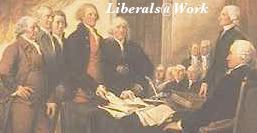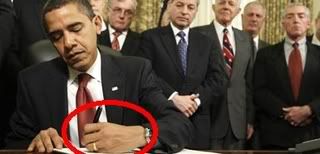You can stop calling banks or investment firms a financial services "industry" while you're at it.
My desktop American Heritage Dictionary defines industry as: 1. economic activity concerned with the processing of raw materials and manufacture of goods in factories. The online version is similar, specifically referring to the manufacturing sector of the economy, but notes the changing times:
Magically turning risky debt into a valuable asset by slicing and repackaging questionable mortgages into default-swap bond instruments is not "manufacturing" anything but fraud. These folks really thought they found the sorcerer's stone, a way to turn lead into gold.
If you don't make stuff, or things you can make other stuff with, it ain't an industry. Our founders would have scoffed at the idea bankers and land barons, the heirs to the gentrified aristocracy who now inhabit upper management high rise offices across the nation, collectively contribute anything to society other than making capital more conveniently accessible to the "real" economy -- all the while leeching as much as they can get away with from the rest of us and providing absolutely nothing of comparable value in return.
The very idea that providing more and more money to a class of people whose raison d'être is the accumulation of more and more and never the distribution of wealth, and somehow that largess would "trickle down" in any meaningful way to the rest of us is perhaps the biggest fraud since the industrial revolution.
Thom Hartmann on Countdown explained it all so well.
Tony Wikrent's analysis of Hartmann's thesis at epluribusmedia.net is even more apt.
One can look to the American oligarchy's emergence from the world-wide economic collapse of the 1870s as well (the Long Depression), a period more comparable to today than the Great Depression of the 1930s.
Folks like Carnegie and Rockefeller represented a class of American industrialists who could take advantage of the fire sale of companies when we faced a similar economic meltdown -- a Gilded Age for the rich few, a nightmare for the rest of us. It began with a housing bubble spurred by new and exotic debt instruments and innovations (credit default swaps versus fixed return bonds), a new center of economic gravity came on the world stage (now China and India, then it was the USA), the transportation manufacturers faced near certain doom (now GM/Chrysler, then the Railroads), A stock market crash paralyzed the rest of the economy and the massive joblessness caused the newly homeless and poverty stricken to look for an easy scapegoat (now Hispanic immigrants, then it was the beginnings of virulent anti-semitism manifesting in the Jewish pogroms in the 1880s).
A simple look at what it took to successfully emerge from both the Long and Great Depressions should give us some clues for what we need now. We know that a Keynesian combination of jobs programs and stringent regulation of banks and investment firms coupled with a social safety net began to lead us out of the mess of the 30s, with the total mobilization of the manufacturing industry leading up to WWII brought us to superpower status. In the 1800s, refinancing the railways and government giveaways of public resources to commercial interests made things nice for those who were able to survive the 1873 Panic, but only led to another crash 20 years later.
Needless to say, examining today in light of other Depressions does nothing to sway my long held belief that we should "Eat The Rich," including the much overrated (and fellow Toledoan) author P.J. O'Rourke who ten years ago was ridiculing the impotence of China as player on the economic stage.
My desktop American Heritage Dictionary defines industry as: 1. economic activity concerned with the processing of raw materials and manufacture of goods in factories. The online version is similar, specifically referring to the manufacturing sector of the economy, but notes the changing times:
A clear indication of the way in which human effort has been harnessed as a force for the commercial production of goods and services is the change in meaning of the word industry. Coming from the Latin word industria, meaning “diligent activity directed to some purpose,” and its descendant, Old French industrie, with the senses “activity,” “ability,” and “a trade or occupation,” our word (first recorded in 1475) originally meant “skill,” “a device,” and “diligence” as well as “a trade.” Over the course of the Industrial Revolution, as more and more human effort became involved in producing goods and services for sale, the last sense of industry as well as the slightly newer sense “systematic work or habitual employment” grew in importance, to a large extent taking over the word. We can even speak now of the Shakespeare industry, rather like the garment industry.
Magically turning risky debt into a valuable asset by slicing and repackaging questionable mortgages into default-swap bond instruments is not "manufacturing" anything but fraud. These folks really thought they found the sorcerer's stone, a way to turn lead into gold.
If you don't make stuff, or things you can make other stuff with, it ain't an industry. Our founders would have scoffed at the idea bankers and land barons, the heirs to the gentrified aristocracy who now inhabit upper management high rise offices across the nation, collectively contribute anything to society other than making capital more conveniently accessible to the "real" economy -- all the while leeching as much as they can get away with from the rest of us and providing absolutely nothing of comparable value in return.
The very idea that providing more and more money to a class of people whose raison d'être is the accumulation of more and more and never the distribution of wealth, and somehow that largess would "trickle down" in any meaningful way to the rest of us is perhaps the biggest fraud since the industrial revolution.
Thom Hartmann on Countdown explained it all so well.
Tony Wikrent's analysis of Hartmann's thesis at epluribusmedia.net is even more apt.
The problem was – and still is – that the Reaganuts failed to recognize that actual industry is morally superior to usury, rent, and speculation. And here is where I want to explain that there is a fourth way an oligarch that loathes work can make a living – management. If you think about it, many of the problems in the U.S. economy – the deterioration of quality, the lack of customer service, the 30-year decline of working class wages, the amazing and enraging unaccountability of top executives - arise from the peculiar fact that American MBA programs do not really turn out industrial managers, so much as they train plantation overseers and work gang bosses.
Go back and look at how the English oligarchy adapted to the Industrial Revolution: the ruling families that survived and prospered did so by seizing control of manufacturing companies and imposing themselves as a new management class. This long, multi-generational process of replacing industrial entrepreneurs with managers from the oligarchy had the highly visible effect of retarding British industrial development and quality, especially as compared to other countries. A similar effect has occurred in the United States since the Reagan Revolution, with the U.S. losing the technological lead in industry after industry, and often losing some industries, such as shoe making or textiles, almost entirely.
It is that national failure over the past three decades to differentiate real economic activity from usury, rent, and speculation that has led to the present crisis. It is that failure that has allowed American manufacturing industry, over the past three decades, to be subjected to the whims and caprices of corporate raiders, megalomaniacal empire builders, and Wall Street analysts and traders insisting that the next quarter be better than the last.
It is that failure that has led to the creation of an American ruling class that believes it is, above all, entitled to rule, just because it is.
One can look to the American oligarchy's emergence from the world-wide economic collapse of the 1870s as well (the Long Depression), a period more comparable to today than the Great Depression of the 1930s.
Folks like Carnegie and Rockefeller represented a class of American industrialists who could take advantage of the fire sale of companies when we faced a similar economic meltdown -- a Gilded Age for the rich few, a nightmare for the rest of us. It began with a housing bubble spurred by new and exotic debt instruments and innovations (credit default swaps versus fixed return bonds), a new center of economic gravity came on the world stage (now China and India, then it was the USA), the transportation manufacturers faced near certain doom (now GM/Chrysler, then the Railroads), A stock market crash paralyzed the rest of the economy and the massive joblessness caused the newly homeless and poverty stricken to look for an easy scapegoat (now Hispanic immigrants, then it was the beginnings of virulent anti-semitism manifesting in the Jewish pogroms in the 1880s).
A simple look at what it took to successfully emerge from both the Long and Great Depressions should give us some clues for what we need now. We know that a Keynesian combination of jobs programs and stringent regulation of banks and investment firms coupled with a social safety net began to lead us out of the mess of the 30s, with the total mobilization of the manufacturing industry leading up to WWII brought us to superpower status. In the 1800s, refinancing the railways and government giveaways of public resources to commercial interests made things nice for those who were able to survive the 1873 Panic, but only led to another crash 20 years later.
Needless to say, examining today in light of other Depressions does nothing to sway my long held belief that we should "Eat The Rich," including the much overrated (and fellow Toledoan) author P.J. O'Rourke who ten years ago was ridiculing the impotence of China as player on the economic stage.
 Exposing the lack of compassion by conservatives and
debunking right wing hypocrisy at every opportunity.
Exposing the lack of compassion by conservatives and
debunking right wing hypocrisy at every opportunity.





 Subscribe via Email
Subscribe via Email
0 Comments:
POST A COMMENT